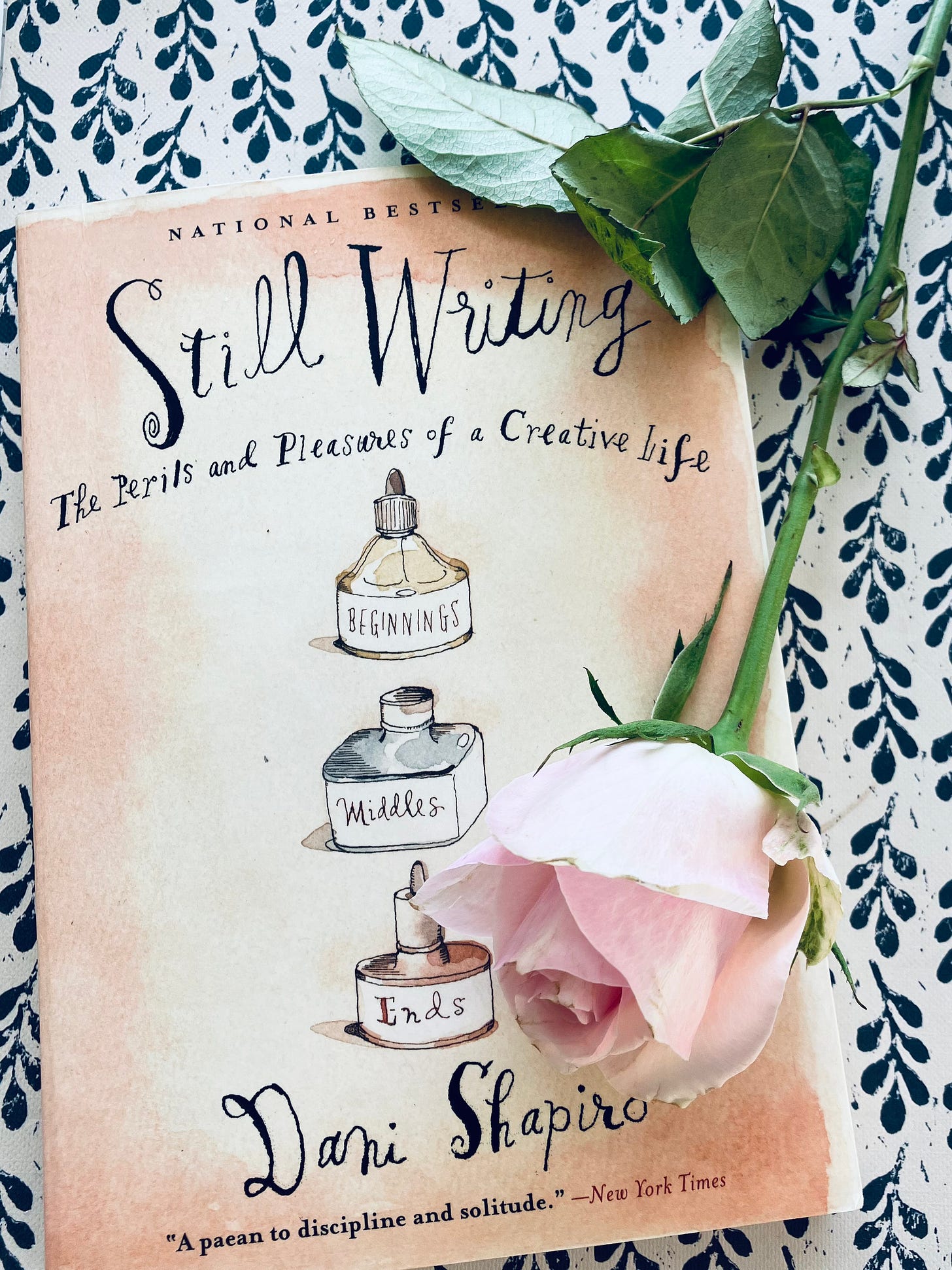I often think of giving up writing. I sometimes voice my intention aloud, but those who know me take little notice. They’ve heard it all before, for me it’s still very real.
At difficult and dangerous times such as these, there is one book I return to again and again, the book that so far has never failed to set me back on track: Still Writing, The Perils and Pleasures of the Creative Life, by Danni Shapiro.
The temptation to give up happens especially when I’m between books, when I invariably get out my memoir file and contemplate once again the memoir I will most likely never write. Why is this? Why do I think about giving up the thing that has brought me such creative satisfaction, such joy?
Here is Shapiro on being between books:
When I’m between books, I feel as if I will never have another story to tell. The last book has wiped me out, has taken everything from me, everything I understand and feel and know and remember and that’s it. There’s nothing left, a low-level depression sets in and the world hides its gifts from me. It has taken me years to realise that this feeling, the one of the well being empty, is as it should be. It means I’ve spent everything, and so I must begin again.
Writing is tough. Novels are long. They require a lot of hard work; it’s not a sprint but a marathon. And it never gets any easier. The writing life requires persistence and endurance, and of course the ability to deal with failure. It’s hard to know if we're getting it right, if what we do is any good, if it’s worthwhile. We are all unsure of ourselves and when our book fails to reach the number of readers we would like, or when we watch other books, achieving much greater coverage and commercial success, it's hard not to wonder if our book is good enough.
Even when we understand the difficulties and vagaries of the market, or even, as in my case, when we make a deliberate choice to take ourselves out of this market, we still experience that sense of failure on some level or another. We ask ourselves, can I do this again and does it really matter anyway?
The more we have at stake, the harder it is to make the leap into writing. The more we think about who’s going to read it, what they’re going to think, how many copies will be printed, whether this magazine or that magazine will accept it for publication, the further away we are from accomplishing anything alive on the page - Shapiro
Beginning again means being patient and waiting for the germ of an idea to emerge, and when an idea does emerge, it means dealing with that inner critic, the voice that sits on our shoulder and never really goes away. I’m talking about the censor, the oh so familiar voice that says - that won’t work, it's a waste of time, it’s not very exciting, you won’t be able to pull it off, other people have better ideas, it’s not commercial, no one will want to read it, et cetera et cetera.
Shapiro describes the censor as a guided missile aimed at us when we are at our weakest and most vulnerable, a missile that wants to stop us from entering… the sacred space from which the work springs, that stands in the way of us beginning again.
One way of beginning that Shapiro suggests, that knocks the censor off its perch, is to employ the tactic of telling ourselves we're going to write a short bad book. This has the power to release us from our fear of failure. It’s a beautiful strategy, she says. Anyone can write a short bad book, right? I employ similar strategies, by telling myself it doesn’t even have to be a book, it’s just scribbling, it’s only fragments.
But fragments are good. Start small is Shapiro’s advice. She compares beginning with a jigsaw puzzle and its scattered pieces ‘too many colours and shapes, too many possibilities. Where to even begin?’
Build a corner, she offers. People who are good at jigsaws often start by building a corner, never mind all the other competing pieces, the focus is on this one small task.
Every book, story, and essay begins with a single word, and a sentence, then a paragraph. These words, sentences, paragraphs, may well end up not being the actual beginning.
How true this is. I'm often amazed when I look back at the beginnings of a novel in my notebook to see how much has changed from its original conception; from those first paragraphs. It doesn’t matter where we begin. There are more than four corners for the writer. We just need to make those first marks on the page. And they are marks on the page for me, because all my novels and stories begin in the notebook.
When an idea presents itself it can be hard to know if it’s the one. What I’ve learned is that some ideas play with you for a while but in the end they fall away. Others persist. When an idea won't go away, when something about it excites you, when it finds its way into your dreams, it’s then that you need to honour it and claim it as your own.
It’s then, like now, when I turn to Dani Shapiro and hope she can work her magic for me, at least one more time.
Thanks for reading
Avril x



Thank you Avril - brings me back from the brink of throwing in the towel with writing!
Don't think of books, think of pages. Giving up writing is like giving up breathing. Don't look for 'success' in terms of loud clapping from any quarter. You know your own talent. W.